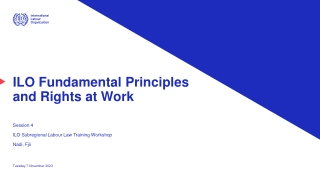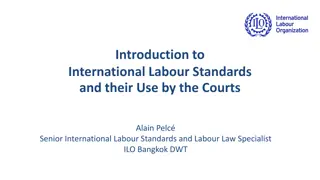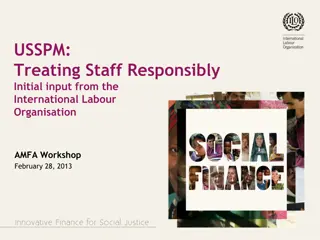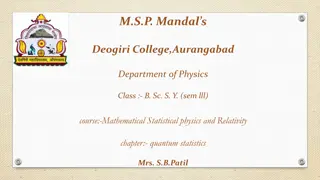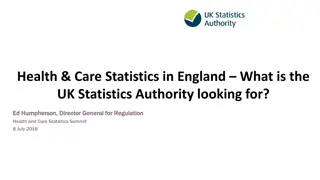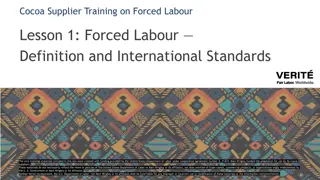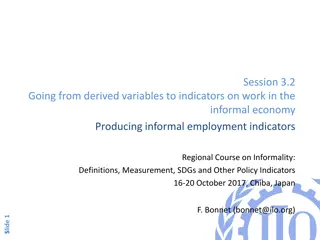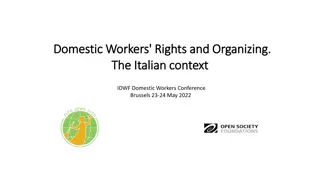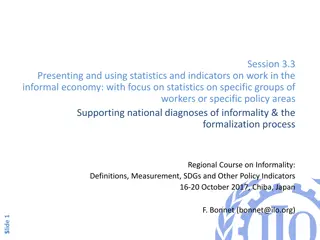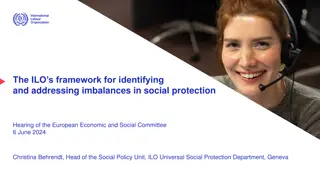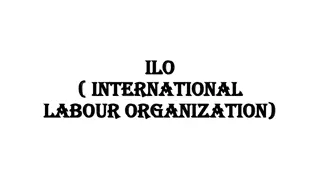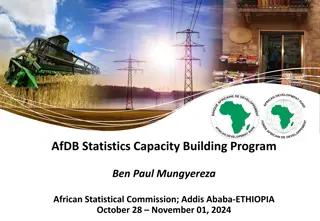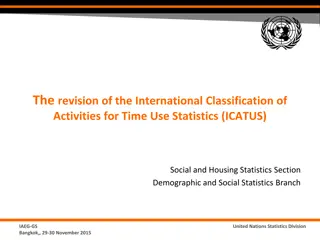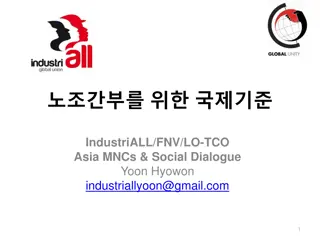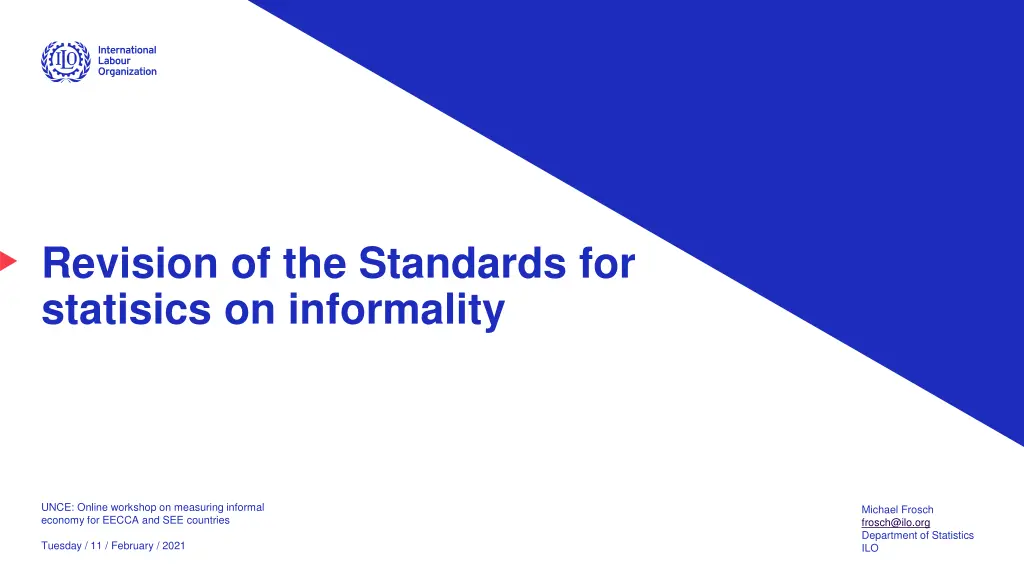
Workshop on Revising Statistics for Informality in Economy
Join the online workshop discussing the latest standards for measuring the informal economy in EECCA and SEE countries. Learn about the current statistical standards, policy frameworks, background to the revision, and the process for aligning informality statistics with recent developments. Enhance your understanding of advancing social justice and promoting decent work in the informal sector.
Download Presentation

Please find below an Image/Link to download the presentation.
The content on the website is provided AS IS for your information and personal use only. It may not be sold, licensed, or shared on other websites without obtaining consent from the author. If you encounter any issues during the download, it is possible that the publisher has removed the file from their server.
You are allowed to download the files provided on this website for personal or commercial use, subject to the condition that they are used lawfully. All files are the property of their respective owners.
The content on the website is provided AS IS for your information and personal use only. It may not be sold, licensed, or shared on other websites without obtaining consent from the author.
E N D
Presentation Transcript
Revision of the Standards for statisics on informality UNCE: Online workshop on measuring informal economy for EECCA and SEE countries Michael Frosch frosch@ilo.org Department of Statistics ILO Tuesday / 11 / February / 2021
2 The current statistical standards Resolution concerning statistics of employment in the informal sector, adopted at the 15th ICLS, 1993 Defines informal sector, employment in the informal sector Guidelines concerning the statistical definition of informal employment, endorsed at the 17th ICLS, 2003 Defines informal employment Advancing social justice, promoting decent work
3 Policy framework the Resolution concerning decent work and the informal economy (ILO, 2002) Recommendation 204 concerning the transition from the informal to the formal economy (ILO, 2015) SDG indicator 8.3.1 The share of informal employment Advancing social justice, promoting decent work
4 Background to the revision Recent changes in labour standards Resolution I concerning statistics of work, employment and labour underutilization (19th ICLS, 2013) Resolution I concerning statistics on work relationships (20th ICLS, 2018) Introduced a new ICSE-18 -Including: Dependent contractors Introduced the concept of work Introduced ICSaW-18 Five forms of work: Own-use production work, Employment, Volunteer work, Unpaid trainee work, Other work activities Re-defined employment Need to align the statistical framework of informality to the latest statistical developments Advancing social justice, promoting decent work
5 Increased experiences Current definitions of informal sector and informal employment are flexible More than 60 countries have a regular measurement Estimates can be produced for more than 100 countries Consensus around main criteria to use Based on country practices these definitions can be strengthened Advancing social justice, promoting decent work
6 Process for revision A strong mandate by the 20th ICLS to develop a revised framework Establish a working group of individuals with relevant technical expertise including: Experts representing all regions Experts in labour statistics as well as economic statistics NSO s, ministries, workers and employers representatives International organisations 1st WG group meeting 2019, 2nd online WG meeting 2020 Draft resolution(s) to Tripartite Meeting of Experts on Labour Statistics Final consideration at the 21st ICLS (in 2023) Advancing social justice, promoting decent work
7 Underlying ideas of the new framework Informal economy: Include all informal productive activities Still a very broad umbrella concept, not particular useful as such Introduce the underlying concept of informal productive activities: defined as all productive activities carried out by persons and economic units that are in law or in practice not covered by formal arrangements Informal market economy: Include all informal productive activities for pay or profit More focused concept would include the informal sector, informal employment and partly informal productive activities Complemented with essential categories of informal productive activities outside the IME but within the IE. Recognizing that informal productive activities are carried out by economic units as well as by persons Includes productive activities within the SNA general production boundary Smaller concptual unit than economic unit, worker, job etc.
8 A broad but focused statistical framework Enables compilation and analysis of data from different perspectives: Informal market economy from the perspective of: The economic unit (informal sector) Worker (informal employment) Informal economy still essential: Recognizes that informal production is also carried out by households That forms of work other than employment can be informal Identification of essential categories of informal productive activities outside the IME but within IE e.g. unpaid trainee work, subsistence work Sectorial analyses including different form of work/production such as care work or agriculture Complemented with: Partly informal productive activities carried out by formal enterprises and workers with formal jobs Advancing social justice, promoting decent work
Informal productive activities The structure of the framework For pay or profit Production Not for pay or profit 9 Liable to become formal or already formal Partial regulated or not at all but liable to be regulated Workers Informal work Formal employment with party informal activities Own use production work, Unpaid trainee work, Volunteer work carrying out informal productive activities Informal employment Either main or secondary formal jobs with partly informal activities Either main or secondary informal jobs [Essential categories] Carry out the work for Economic units in: Formal sector Formal sector Informal sector Households (HOP-sector) Formal sector Informal sector Households (HOP-sector) Liable to become formal or already formal Partial regulated or not at all but liable to be regulated Economic units Informal production Formal sector with partly informal production for pay or profit Household producing for own final use (incl. direct volunteer work, non-formal NPI) Informal sector Informal employment Informal unpaid trainee work Informal volunteer work Informal employment Informal unpaid trainee work Informal volunteer work Informal own-use production work Informal employment Informal volunteer work Labour input SNA production boundary Goods Services Relation to 2008 SNA SNA general production boundary Type of production Informal non-market economy Informal market economy Informal Economy
10 In addition Refinements of the definitions: Including the informal sector and infromal employment Introduce a supporting indicator framework: Provide data on the structure of informality within a country Contextualize the dichotomies of informal/formal employment and informal/formal enterprises, reflecting that informality is a continuum Based on the ILO diagnostic tool to crate a link with policy making. Clarify their conceptual meaning Strenghening the definitions, based on current country practicies Advancing social justice, promoting decent work
Informal productive activities The structure of the framework For pay or profit Production Not for pay or profit 12 Liable to become formal or already formal Partial regulated or not at all but liable to be regulated Workers Informal work Formal employment with party informal activities Own use production work, Unpaid trainee work, Volunteer work carrying out informal productive activities Informal employment Either main or secondary formal jobs with partly informal activities Either main or secondary informal jobs [Essential categories] Carry out the work for Economic units in: Formal sector Formal sector Informal sector Households (HOP-sector) Formal sector Informal sector Households (HOP-sector) Liable to become formal or already formal Partial regulated or not at all but liable to be regulated Economic units Informal production Formal sector with partly informal production for pay or profit Household producing for own final use (incl. direct volunteer work, non-formal NPI) Informal sector Informal employment Informal unpaid trainee work Informal volunteer work Informal employment Informal unpaid trainee work Informal volunteer work Informal own-use production work Informal employment Informal volunteer work Labour input SNA production boundary Goods Services Relation to 2008 SNA SNA general production boundary Type of production Informal non-market economy Informal market economy Informal Economy

